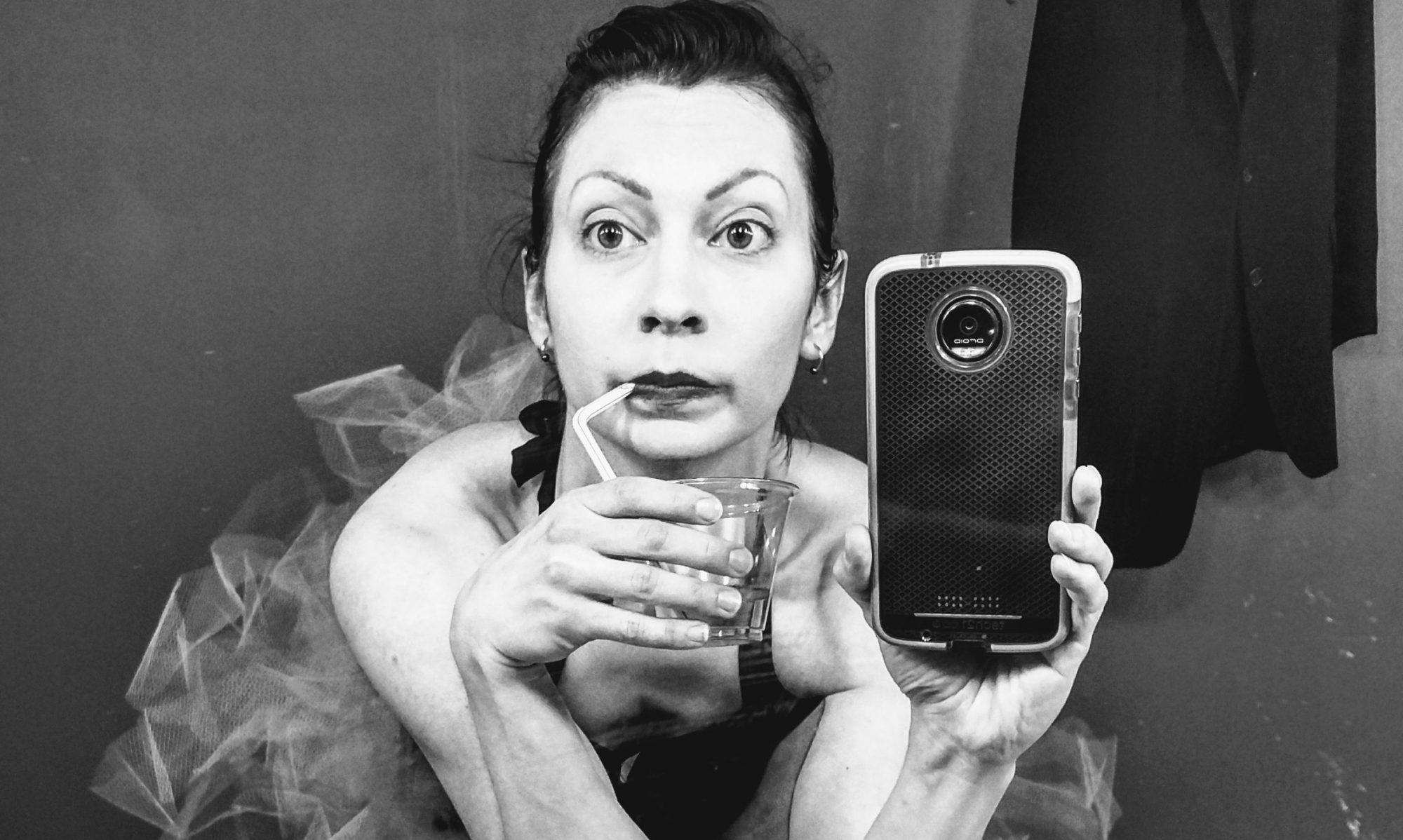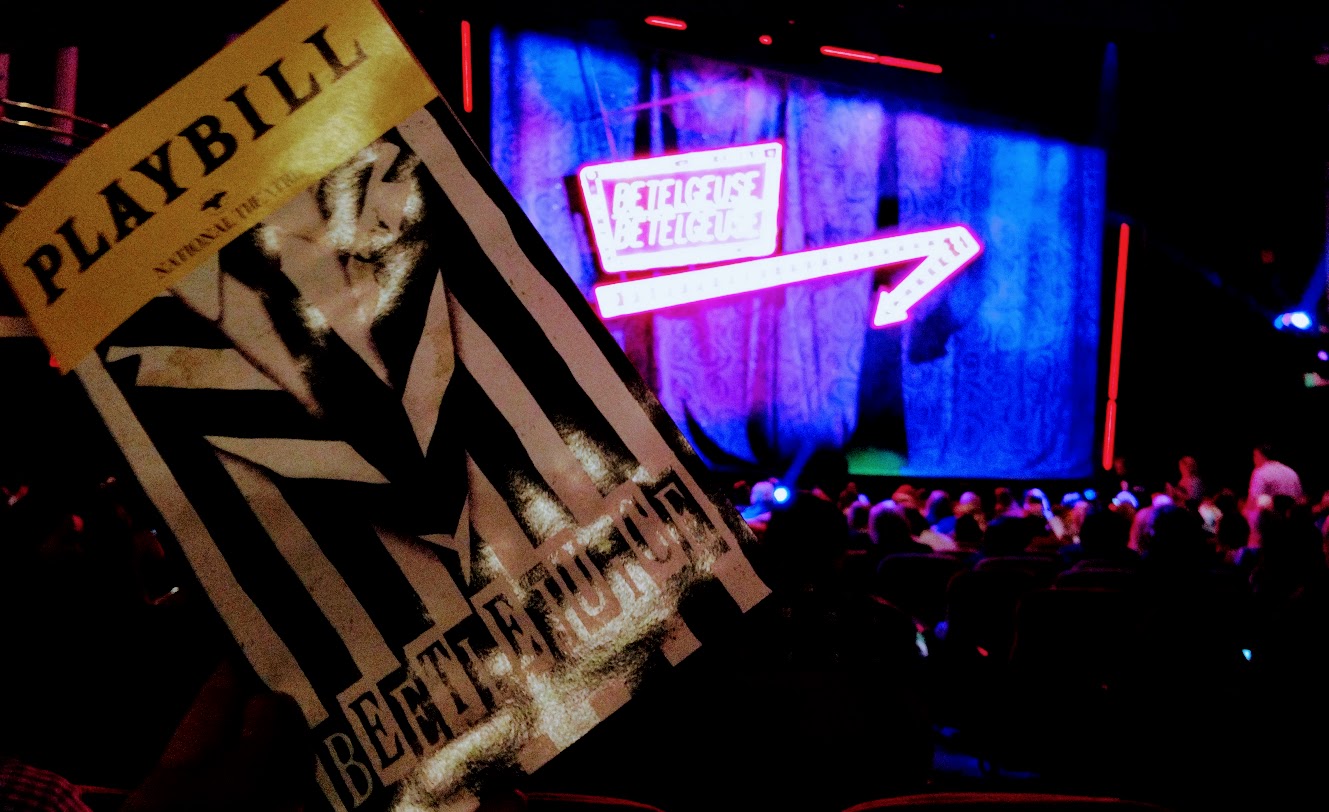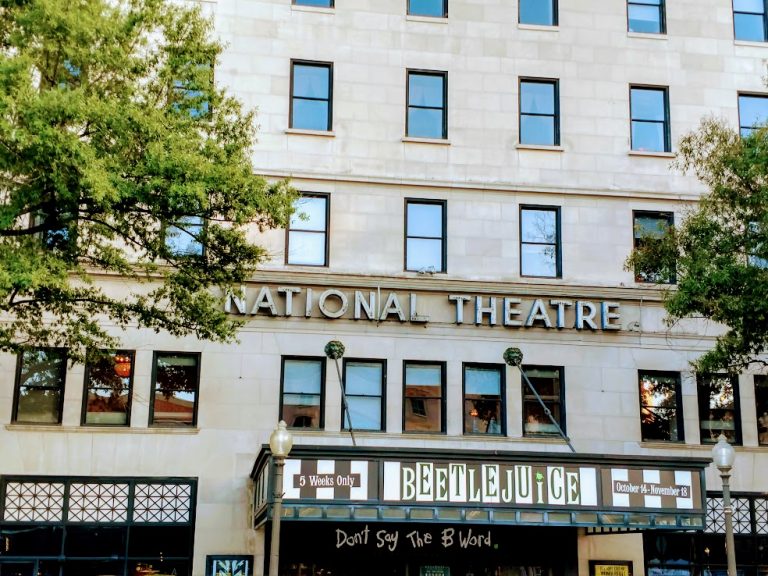
Not two hours before curtain of his first Beetlejuice preview at DC’s National Theatre, Alex Brightman was at Hamilton – the restaurant, not the show. Calm, comfortably dressed, Brightman took time to hug familiar faces and meet their dining companions, charming as ever – impressively collected for an actor about to step into the character of a demon who personifies pure id. At that point, fewer than 200 audience members had witnessed Broadway-bound Beetlejuice – which will return Brightman to his former Dewey Finn dressing room at the Winter Garden next spring, earning him the rare distinction of starring in back-to-back musicals making their Broadway debut in the very same theatre. This time, in lieu of teaching ten-year-old Zack Mooneyham – whose workaholic dad won’t listen – the power of face-shredding guitar solos in School of Rock, Brightman will teach teenage Lydia – unseen by her work-focused father – the power of terrorizing people to the point of sh*tting themselves.
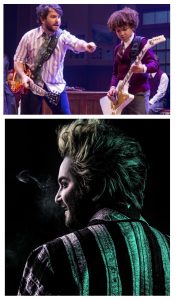
A raw electricity permeates the first preview of any play – accompanied by an infusion of nerve-wrecking energy in the case of contract-signed, Broadway-bound material. All theatre is ephemeral, here one moment and gone the next, but a first preview offers the possibility to see a show that, in all likelihood, will never appear in that particular form again. For those involved behind-the-scenes, first previews provide proof of the magic that exists inside true theatre folk: ready or not, come curtain time the show goes on. For the character of Beetlejuice, this includes clocking fire and musical instruments tossed up from the pit, riding multiple set-pieces – and a number of ad libs Brightman merges effortlessly into Scott Brown and Anthony King’s book, as though part of his body’s exhalation. From first preview, Brightman breathes as Beetlejuice.
Many theatre-goers avoid attending a first preview, knowing the work remains in a state of transition and final tweaking; others seek them out (perhaps for the thrill, perhaps due to the likelihood of a lower ticket price). Brightman himself called it “brave” in this instance – perhaps on account of the creative team’s bold decision to exorcize Beetlejuice from his 1988 PG-rated, family friendly film equivalent and into a show with “REALLY F*$#&*G EXPLICIT” content – opening with references to puppet sex, butt stuff, and snorting a hefty forearm’s worth of cocaine. (Hey, no one sitting in the house can say they weren’t warned!)
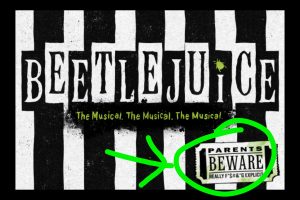
In sharp contrast, audiences meet the show’s co-star, Lydia Deetz, in a state of mourning, at the funeral of her mother; new ghosts on the block Adam and Barbara Maitland begin their arc as a waspy couple facing the recent aftermath of a miscarriage, coping through crib polishing and carrot peeling. After their sudden and untimely deaths, the mild-mannered Maitlands scheme to scare Lydia and her businessman father, Charles, out of their home – before Deetz converts it into the model unit of “rural retreats for urban elites” that shoehorn the concept of “family” into a shallow and misguided abstraction of wealth and sophistication.
Lydia and the Maitlands each start their journeys in a state of sincere grief and loss, Charles surrounds himself with the superficial: all the while, Beetlejuice is on-hand to make gibes about guacamole, herpes, and Katharine Hepburn. No subject matter is safe, from boners to Broadway musicals: Brightman’s Beetlejuice pokes fun at several classics of the Great White Way, some cleverly concealed Easter eggs for theatre-dorks (which Brightman, unabashedly, is) – others actual callouts.
Though the show’s title belongs to Beetlejuice, its heart belongs to Lydia, played by seventeen-year-old Sophia Anne Caruso.

Unleashed by Lydia in a moment of extreme desperation, Beetlejuice is what happens when the root of a problem isn’t confronted head-on – a metaphor made painfully real by the production’s current proximity to a Trump-run White House.
Navigating adolescence, a move, dead mom, dismissive dad – plus ditzy Life Coach Delia, whom dad hires to heal his daughter’s pain, ghosts and demons seem appropriate playmates for a death-obsessed teen who longs to reunite with her mom on the “other side.” Much like an extra-angsty Mary Lennox in The Secret Garden, Lydia finds herself isolated “high on a hill [in] a big old house with something wrong inside it,” equally intrigued by the idea of invoking spirits – except the insufferable male hidden up in Lydia’s attic is an actual demon, not just a whiny brat with a bad back.
Audiences may recall Caruso’s brilliant performance as Helen Keller, a role she tackled at age nine, under the direction of Patty Duke (who had originated the role on Broadway in 1959) – or perhaps her heart-stopping appearance alongside Jeff Daniels and Michelle Williams in the 2016 Broadway revival of Blackbird. The point being: Caruso is the real deal when it comes to embodying vulnerable trauma on-stage, and it will be exciting to track the evolution of her journey in this role opposite Brightman’s Beetlejuice.
The show’s second act deals with an arranged marriage-slash-murder plot between “Creepy Old Guy” (Beetlejuice) and his underage bride (Lydia), played out alongside jokes about pedophilia, dead parents, and pubic hair (“just like Lolita – but fine!”). Recognizing this taboo topic and the dark brand of humor Beetlejuice brings, Director Alex Timbers at one point turns the entire cast to face its audience – Beetlejuice included – to express disbelief that “some cultures think this kind of thing’s alright!?” At all times it is clear: the show does not promote this behavior. (Fun fact: two of the show’s writers, Eddie Perfect and Anthony King, dedicate the piece to their wives and daughters. –Semi-related fun fact: Director Alex Timbers and Brightman both dedicate their work to recently departed icon of stage and screen Carole Shelley.)
A ballad from Barbara Maitland attempts to balance the bawdy darkness, taking a beat to sing about the “mother [she] never got to be.” Kerry Butler’s performance is sweet and heartfelt, framed overhead by a strip of attic ceiling boards that resemble a white picket fence suspended in mid-air (props to set designer David Korins for this lovely detail). The moment, however, feels very much out-of-place in this show (at least for now – reminder: first preview here).
There is a subtle connection to be seen in Brightman’s back-to-back Broadway leading roles – one akin to a line from Truman Capote’s In Cold Blood, confessing a feeling of connection between the author and his homicidal subject: “it’s as if [we] grew up in the same house. And one day he stood up and went out the back door, while I went out the front.” Where Dewey Finn wanted to compete in the Battle of the Bands, Beetlejuice wants to “kill lots of people and f*ck sh*t up” – almost as if Dewey Finn never stepped foot into Horace Green Prep and, instead, melted his mind with psychotropic drugs and died horrifically. Lydia’s version of a climactic “Teacher’s Pet” guitar solo is committing murder, forgivable in context – heart-warming, even – because she did it alongside loved ones and is now “seen” by her dad.
On the subject of artists making their mark in Beetlejuice (there are many), a shout-out to Kelvin Moon Loh: between his Bowie-channeling glam-rock performance in last season’s SpongeBob SquarePants – called out specifically in Ben Brantley’s Times review – and now embodying hyped-up orgy-loving guru Otho, Loh’s booming voice and ability to own big, trippy variety numbers is likely to grow him a nice niche fan base among Broadway-loving stoners. (Same goes for the mind-bending projections of Peter Nigrini – another Bikini Bottom alum.)
Beetlejuice also showcases a Netherworld-based boy band that pumps out velvety vocals and slick dance moves (props to Eddie Perfect for the side-splitting ensemble lyric by one “Boy Inferno” back-up dancer: “I’m 36, so I stay in the back, yo!” #truth). And Leslie Kritzer’s impressive vocal chops as Delia are a reason to believe in life coaching.
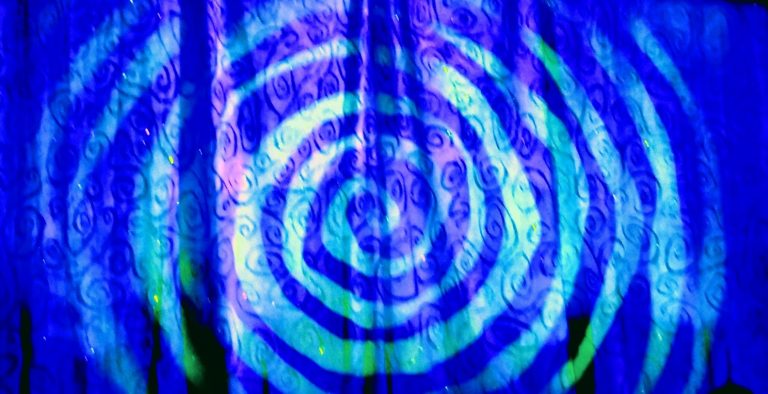
GO SEE BEETLEJUICE:
If for no other reason, to witness Brightman’s artistry in taking on another massive leading role – and crushing it with inspiring commitment to character and unbelievable energy, which seems to be his wheelhouse. (Ditto for Caruso: she’s certainly one to watch hone her own distinct frequency.)
A dare to parents: consider taking your kids – seriously – especially if they’re budding Broadway geeks who saw Brightman’s Tony-nominated performance in School of Rock. (There’s nothing more extreme here than the more memorable lyrics from Book of Mormon‘s “Hasa Diga Eebowai” or “Joseph Smith American Moses” – and it’s highly unlikely Beetlejuice will get more filthy between first out-of-town preview and Broadway.)
Have a pre-show discussion about the reasons behind using shock value in art – in this instance as a way of showing the dangers that befall emotional struggles that go unaddressed. Celebrate an actor’s artistic range – that the same guy who got them picking up guitars and drum sticks is now tap dancing and making dick jokes and riding a Graboid on the very same stage. (And two hours before his first preview, took time to make rounds at a nearby restaurant, playfully helping a server hand-off a gluten-free beer – to the author of this piece.)
I approach theatre as a writer who understands, appreciates – and respects – all sides of the artform, particularly the human component: hardworking people, collaborating tirelessly to build great art for a stage. Team Beetlejuice is devoted, talented – and they’re making some great, if “REALLY F*$#&*G EXPLICIT” art: check it out.
(How Beetlejuice compares to its source material is a subject best left for other writers – ones who’ve seen the film.)
More JMSunderduress you may enjoy…
WHY I GAVE GETTIN’ THE BAND BACK TOGETHER A STANDING OVATION
